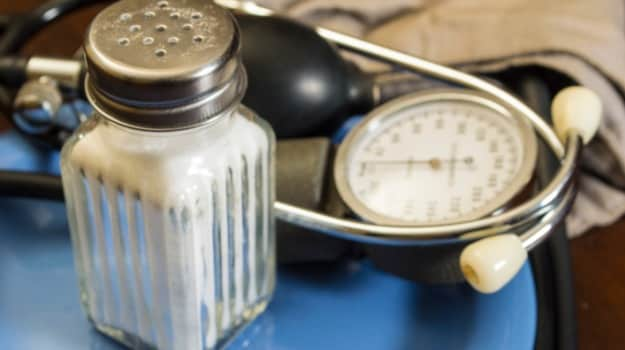When it comes to salt, there are countless studies that sometimes disagree with each other. There was one published in the American Journal of Hypertension which suggested that a diet with low salt or sodium intake could harm your health. On the other hand, the World Health Organisation (WHO) suggests that high salt intake could increase the risk of heart disease. All of this makes it extremely difficult to understand where do you draw the fine line? How much is too much and how little is too little?
For those suffering from high blood pressure, salt is a definite no no. They must restrict the quantity of salt in all their meals but what if you've got normal blood pressure. Can you be liberal with the use of salt?
(How Experts Use Salt in Their Food)
A recent study published in the Journal of the American College of Cardiology, puts a break on this notion! Researchers at the University of Delaware have found how a diet with extra sodium content can cause long term damage to various organs including heart, kidneys, brain and blood vessels. Those who suffer from high blood pressure and cholesterol are generally recommended to shun salt, but health experts advise others to keep a strict watch on their daily sodium as well.
"Blood pressure responses to alterations in dietary sodium vary widely, which has led to the concept of 'salt-sensitive' blood pressure," said one of the study authors William Farquhar.
"If blood pressure increases during a period of high dietary sodium or decreases during a low-sodium period, the person is considered salt sensitive. If there is no change in blood pressure with sodium restriction, an individual is considered salt resistant," Farquhar noted.
However, the new research points to evidence of adverse effects on multiple target organs and tissues, even for people who are salt resistant.
How can extra salt harm your body?
• Potential effects on the arteries include reduced function of the endothelium, which is the inner lining of blood vessels. Endothelial cells mediate a number of processes, including coagulation, platelet adhesion and immune function.
• Elevated dietary sodium can also increase arterial stiffness.
• Regarding the kidneys, high sodium is associated with reduced renal function, a decline observed with only a minimal increase in blood pressure.
• Sodium may also affect the sympathetic nervous system, which activates what is often termed the fight-or-flight response. "High dietary sodium can also lead to left ventricular hypertrophy, or enlargement of the muscle tissue that makes up the wall of the heart's main pumping chamber," co-author of the review paper David Edwards noted.
"As the walls of the chamber grow thicker, they become less compliant and eventually are unable to pump as forcefully as a healthy heart," Edwards pointed out.
"Chronically elevated dietary sodium may 'sensitize' sympathetic neurons in the brain, causing a greater response to a variety of stimuli, including skeletal muscle contraction," Farquhar noted.
According to a study that came out last year, global sodium consumption is already at an alarming level. The research found that people across the globe are already exceeding the prescribed limit of daily salt intake. The standard limit prescribed by the World Health Organisation is two gram (2,000mg). Surprisingly, the study estimated the global sodium consumption in the year 2010 to be twice as much as the prescribed limit. The study was published in the New England Journal of Medicine which stated that the rise in sodium consumption has resulted into more than 1.6 million cardiovascular-related deaths per year.
High Sodium Diet Causes More Than 1.6 Million Deaths Every Year
How to Reduce Salt Intake
• Do away with the salt shaker. Once you don't see it on your table, chances are that you'll skip putting some extra in your meals. • Cook with less salt
• Avoid processed and fast food. Also, avoid condiments that have extra sodium added, i.e. salad dressings, soy sauce, ketchup, mustard sauce, other dips and sauces. • Read through your labels wisely to look out for sodium or related compounds, such as, baking soda, baking powder, monosodium glutamate (MSG)
Inputs from IANS







